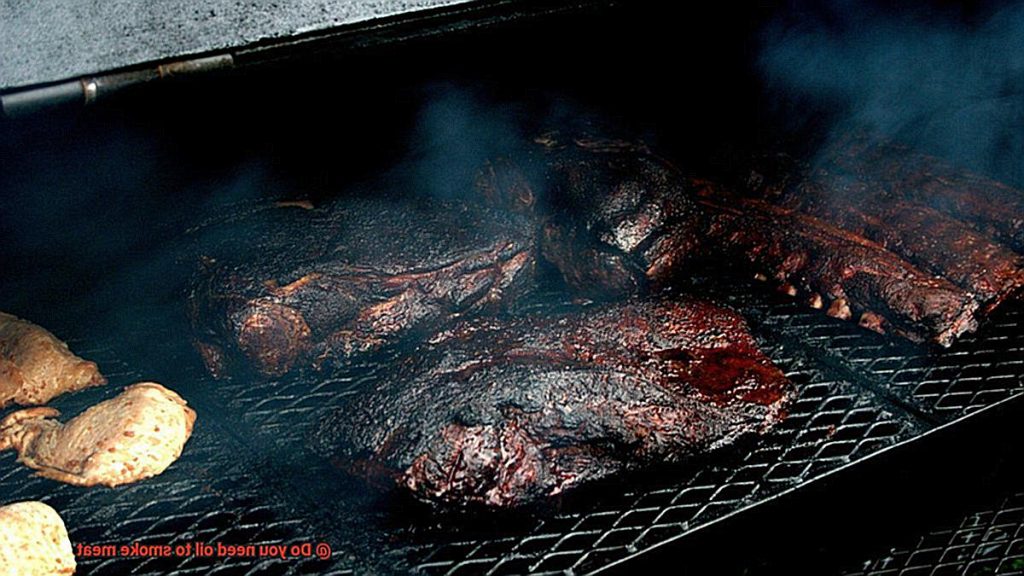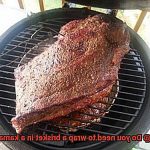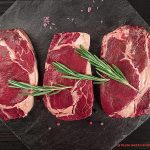Are you a BBQ fanatic on the hunt for that secret ingredient to take your smoked meats from good to mind-blowing? Well, look no further. As you dive into the world of smoking, you might be wondering if using oil is really necessary. Hold onto your tongs because we’re about to spill the beans on how oil can revolutionize your meat smoking game.
Sure, smoking meat already delivers an incredible flavor punch, but adding oil to the mix takes it up a notch. We’re talking intensified flavors and juiciness that will make your taste buds jump for joy. So, let’s dig into why oil deserves a front-row seat in your smoking arsenal and guarantees mouthwatering meat creations.
With years of experience and countless experiments under our belts, we’re here to debunk myths and unravel the true wonders of oil-infused smoking. Get ready to wow your friends and family with smoked meat like never before. Excited yet? We thought so.
So, throw on your apron, fire up that smoker, and join us on this smoky journey where oil steals the spotlight. It’s time to unlock the secrets and become a master of perfectly smoked meat with just a touch of magic oil. Let’s get smokin’.
Contents
What is Smoking Meat?
Smoking meat is a culinary technique that has stood the test of time, enriching the flavor of meats while preserving them. Whether you’re an experienced BBQ aficionado or just venturing into the world of grilling, understanding the intricacies of smoking meat can elevate your cooking skills and tantalize taste buds. Let’s delve into the realm of smoking meat and uncover the secrets behind this ancient gastronomic art.
The Preservation Power of Smoke:
- Originating as a means of preserving food before refrigeration, smoking meat has a long history.
- Natural compounds in wood act as preservatives, inhibiting bacterial growth and preventing spoilage.
- Low temperatures and dehydration through smoking help maintain the integrity of meats.
Flavor Infusion:
- Smoking imparts a distinct, sought-after smoky flavor that delights BBQ enthusiasts.
- Different woods, such as hickory, mesquite, applewood, or cherry, produce unique flavors and aromas.
- Seasoning meat with dry rubs or marinades enhances flavor profiles and adds complexity.
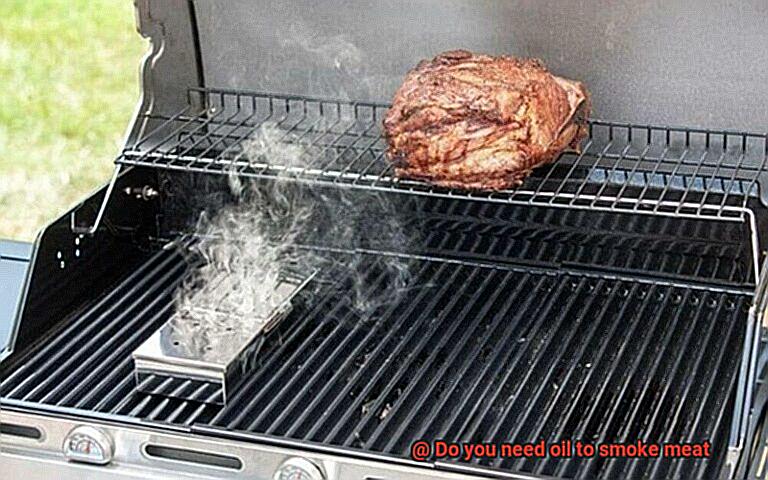
The Smoking Process:
Preparing the Meat:
- Applying a thin layer of oil to retain moisture and prevent sticking (optional).
- Seasoning meat with dry rubs or marinades for additional flavor.
Setting up the Smoker:
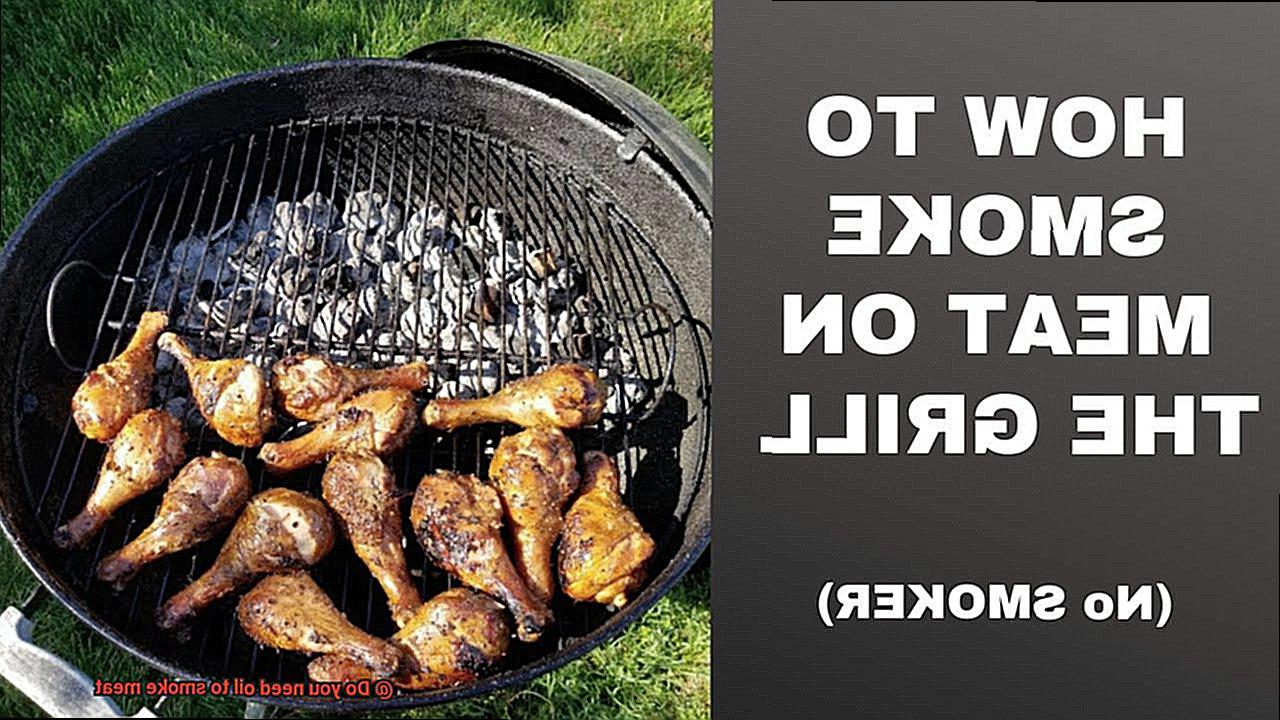
- Choosing a smoker or preparing a grill for smoking.
- Maintaining a low temperature between 225°F and 275°F (107°C and 135°C).
Smoking the Meat:
- Placing the seasoned meat on the smoker or grill.
- Using vents, dampers, or adjusting heat sources to control airflow and maintain consistent temperature.
- Cooking time varies based on meat type and size.
Oil in Smoking:
- Oil can be used to prevent sticking to the cooking surface and create a flavorful crust.
- Fattier cuts may not require additional oil, while leaner cuts can benefit from a light coating.
What are the Benefits of Using Oil in Smoking Meat?
Today, we will explore the myriad benefits of using oil in this time-honored technique. Brace yourself for mouthwatering flavors, tender textures, and an unforgettable culinary experience that will leave your taste buds begging for more.
Enhanced Flavor:
Prepare for a sensory delight as oil becomes your trusty ally in creating perfectly smoked meat. When applied to the surface before smoking, oil acts as a moisture-locking shield, preventing dryness and infusing the meat with succulence. The result is tender, juicy cuts bursting with rich, smoky flavors. The even distribution of smoke across the meat’s surface takes it to new heights of deliciousness.
Tenderizing Effect:
Bid farewell to tough and chewy meat. Oil acts as a natural marinade, working its magic by breaking down connective tissues. As it penetrates deep into the meat’s fibers, it allows the flavors of herbs and spices to weave their symphony of taste. The result? A melt-in-your-mouth texture that will make your taste buds dance with joy.
Prevents Sticking and Promotes Even Cooking:
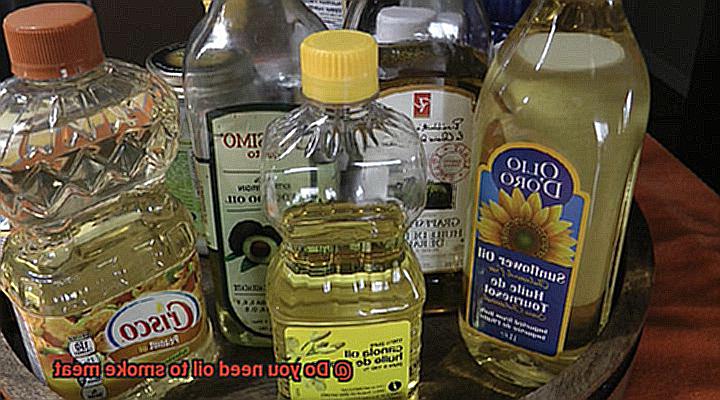
Say goodbye to frustrating moments when your prized piece of meat sticks relentlessly to grates or smoker racks. By generously applying oil before smoking, you create a non-stick shield that ensures easy handling and minimal risk of tearing or losing precious pieces. Additionally, oil acts as a heat conductor, facilitating even distribution of heat throughout the meat. No more worries about undercooked or overcooked areas – just perfectly cooked and tender meat every time.
Crispy Exterior:
Imagine sinking your teeth into a piece of meat with a delectably crispy exterior. With oil, achieving that golden-brown crust becomes a breeze. As the oil heats up during the smoking process, it transforms into a magical elixir, creating a tantalizingly crispy exterior that adds texture and elevates the overall eating experience to new heights.
Easy Cleanup:
After indulging in a smoky feast, the last thing you want is to spend ages scrubbing and scraping grates or racks. Fear not. By applying oil to the meat beforehand, you create a protective layer that prevents sticking. This means less time spent on cleanup and more time savoring the fruits of your labor.
How Does Oil Help in Creating a Flavorful Crust on the Exterior of the Meat?
Oil is a game-changer when it comes to creating a flavorful crust on the exterior of smoked meat. Let’s dive into the sizzling world of oil and discover how this simple ingredient can take your grilling game to new heights.
First and foremost, let’s talk about the mouthwatering Maillard reaction. This tantalizing phenomenon occurs when amino acids and reducing sugars in the meat unite under intense heat, resulting in the creation of a delicious crust. And guess what? Oil plays a pivotal role in enhancing this reaction.
One of the key benefits of using oil is its ability to conduct heat evenly across every inch of your prized cut. This means that every nook and cranny receives the same amount of heat, ensuring a consistent crust that will have you salivating. No more worrying about unevenly cooked meat.
But wait, there’s more. Oil also acts as a protective shield between the meat and the scorching heat of the smoker. By forming this barrier, oil prevents excessive charring or burning, giving you a controlled cooking process that will leave your taste buds begging for more. Say goodbye to dry and overcooked meat forever.
Now, let’s talk flavor. When you slather oil on your meat, it creates a seal that locks in moisture and natural juices. This retention of moisture enhances the overall flavor and juiciness, making every bite a succulent delight that will have you reaching for seconds. And here’s a juicy tidbit – certain oils can even infuse their own distinct flavors into the crust. Imagine a subtle fruity note from olive oil or a rich nutty taste from sesame oil. These flavor profiles can transport your smoked meats to flavor heaven.
And if you’re someone who loves playing with spices and rubs, oil is your ultimate sidekick. It ensures that these flavor-packed companions adhere to the meat’s surface, so they stay put during the smoking process. No more losing flavor as it drips away into the abyss of the smoker.
Do All Meats Require Oil When Smoking?
So, grab your aprons and get ready for a flavorful exploration.
When it comes to smoking meat, not all cuts require oil. The decision to use oil depends on various factors that can make or break your grilling game. Let’s break it down:
- Sticking: Leaner cuts of meat, like poultry or certain types of fish, benefit from a light coating of oil. This prevents them from sticking to the grates and tearing apart when you flip them. If you’ve marinated or applied a dry rub to your meat, using oil as a barrier between the meat and the grates is especially important.
- Fat Content: Fattier cuts of meat, like pork shoulder or beef brisket, have enough natural fat to prevent sticking without additional oil. In fact, adding oil to these cuts can sometimes cause flare-ups or excessive smoke, which can negatively impact the flavor and texture of your meat.
- Flavor Profile: Oil can work wonders in enhancing the flavors of your meat by acting as a carrier for spices and seasonings. It can also help create a crispy exterior when smoked at high temperatures. However, some purists argue that adding oil can mask the natural flavors of the meat. So, it boils down to personal preference and how adventurous you want to get with your flavors.
Now that we’ve covered the basics, let’s get down to business. When deciding whether to use oil when smoking meat, consider factors like fat content, marinades or rubs, and the desired flavor profile. It’s all about finding that sweet spot that suits your taste buds and cooking style.
So, my grilling amigos, the answer to the question “Do all meats require oil when smoking?” is a resounding no. It all depends on the cut of meat, your personal preferences, and the flavors you’re aiming to achieve. Don’t be afraid to experiment, learn from your experiences, and let your taste buds guide you on this smoky journey.
What Types of Meats Benefit from a Light Coating of Oil Before Smoking?
In this guide, we’ll explore which types of meats benefit from an oil coating before hitting the smoker.
Fatty Cuts: Juicy and Tender Delights
Pork shoulder, beef brisket, and chicken thighs thrive with a touch of oil. These fatty cuts love the extra moisture and flavor. As they smoke, the oil helps render the fat, resulting in mouthwatering tenderness and a delectable crust.
Lean Cuts: Keeping Juiciness Intact
Chicken breast or lean beef cuts can sometimes turn dry during smoking. That’s where your trusty oil comes in. A light coating seals in moisture, preventing these cuts from drying out. Say goodbye to tough and hello to juicy.
Fish and Seafood: No More Sticking.
Fish fillets and shrimp lovers, rejoice. A light coating of oil prevents these delicate treasures from sticking to the grill grates. Plus, it adds an enticing flavor that complements their natural taste.
Choosing the Right Oil:
Select oils with high smoke points like vegetable, canola, or peanut oil. These withstand high temperatures without burning or creating off flavors, ensuring a smooth smoking experience.
Not Always Necessary:
While oil works wonders for certain meats, some cuts don’t require it. Fatty cuts like ribs or sausages have enough natural fat. Additionally, marinating meat before smoking adds moisture and flavor without needing oil.
Should You Use Oil When Smoking Leaner Cuts of Meat Such as Chicken Breasts or Fish Fillets?
In this article, we will delve into the advantages and disadvantages of using oil when grilling these cuts, equipping you with insights and tips to make an informed decision.
Advantages of Using Oil:
- Locks in Moisture: Lean cuts of meat typically have less fat content, which can lead to dryness during cooking. Coating the meat with oil before smoking creates a barrier that traps moisture, resulting in juicier and more flavorful meat.
- Prevents Sticking: Delicate fish and seafood can easily stick to the grill grates. Applying a light coating of oil creates a non-stick surface, allowing for easy flipping and preventing the delicate flesh from tearing.
- Enhances Flavor: Oil acts as a carrier for herbs, spices, and marinades, intensifying the overall flavor profile of the meat. It helps seasonings adhere better and infuses the meat with a rich, smoky taste.
Disadvantages of Using Oil:
- Risk of Flare-ups: Excessive oil can cause flare-ups on the grill, leading to uneven cooking or burnt spots on the meat. It is crucial to use oil sparingly and keep a vigilant eye on the grill while cooking.
- Greasy Texture: A heavy coating of oil can create a greasy texture on the meat’s surface, masking its natural flavors and overpowering the smokiness imparted during the cooking process.
- Not Always Necessary: Some experts argue that using oil is unnecessary when smoking lean cuts. The smoke itself provides ample moisture to keep the meat juicy, and marinating the meat beforehand can also help retain moisture and add flavor.
Conclusion:
In the end, whether or not to use oil when smoking leaner cuts of meat is a personal preference. While oil can lock in moisture, prevent sticking, and enhance flavor, it is not always essential. The smoke itself provides sufficient moisture, and marinating can achieve similar results. If you choose to use oil, opt for high-temperature cooking oils with a high smoke point, such as vegetable or canola oil.
Does Personal Preference Play a Role in Whether or Not to Use Oil When Smoking Meat?
In the smoky world of grilling, personal preference reigns supreme. When it comes to smoking meat, the decision of whether or not to use oil is a hot topic that can ignite passionate debates among grill masters. So, grab your tongs and let’s dive into the sizzling world of personal preference when it comes to oil and smoking meat.
Some grill enthusiasts swear by the magic of oil when smoking meat. They believe that adding a thin coat of oil to the meat before it hits the smoker can work wonders. Research suggests that oil forms a protective layer on the surface of the meat, locking in moisture and preventing it from drying out during the smoking process. This can result in juicier, more succulent cuts of meat that will have your taste buds dancing with delight.
However, not everyone is an oil aficionado. Some grillers prefer to let the natural fats in the meat do all the heavy lifting. They argue that these fats are sufficient to keep the meat moist and flavorful throughout the smoking process. Plus, they worry that adding oil might create an unnecessary greasy texture or alter the natural flavors of the meat.
Personal preference plays a significant role in this debate, influenced by factors such as cultural background, regional traditions, and individual taste preferences. Different cuisines and cooking styles may have their own take on using oil when smoking meat. Some may rely heavily on oil for flavor and moisture retention, while others may favor dry rubs or marinades instead.
The type of meat being smoked also plays a part in personal preference. Cuts with higher fat content, like pork shoulder or beef brisket, may not require additional oil as they already have ample fat to keep them moist during the smoking process. On the other hand, leaner cuts like chicken breast or fish may benefit from a touch of oil to prevent sticking and add moisture.
It’s important to note that there are no hard and fast rules when it comes to oil and smoking meat. It’s all about finding what works best for your taste buds and desired outcome. Experimentation is key. So, don’t be afraid to fire up the grill, try different techniques, and let your personal preferences guide you on your smoky adventure.
XaXM1obd0pg” >
Conclusion
In conclusion, the addition of oil to your smoking process can take your meat game to new heights, elevating your BBQ skills to a whole new level. By generously coating your meat with a delicate layer of oil before it hits the smoker, you unleash a world of flavor, tenderness, and culinary delight.
Oil acts as a guardian angel, locking in moisture and preventing dryness from infiltrating your precious cuts. It works its magic by tenderizing the meat, breaking down tough connective tissues and transforming them into a heavenly melt-in-your-mouth texture. And let’s not forget that oil also serves as an ally against sticking, ensuring an effortless cooking experience while promoting even heat distribution.
When it comes to creating that irresistible crust on the outside of your meat, oil is the secret weapon you need. It conducts heat like a maestro leading an orchestra, ensuring every inch of your cut receives its fair share of sizzling goodness. This protective shield also prevents any unwanted charring or burning while sealing in all those mouthwatering juices.
However, it’s important to note that not all meats require oil when entering the smoky realm. Fattier cuts like pork shoulder or beef brisket already possess enough natural fat to prevent sticking without any additional assistance from oil. And for those seeking an extra burst of flavor and moisture infusion, marinating can be a worthy substitute for oil.
Ultimately, the decision to use oil when smoking meat lies in the hands of the pitmaster. Consider factors such as fat content, desired flavor profile, and personal taste preferences before making your choice.

